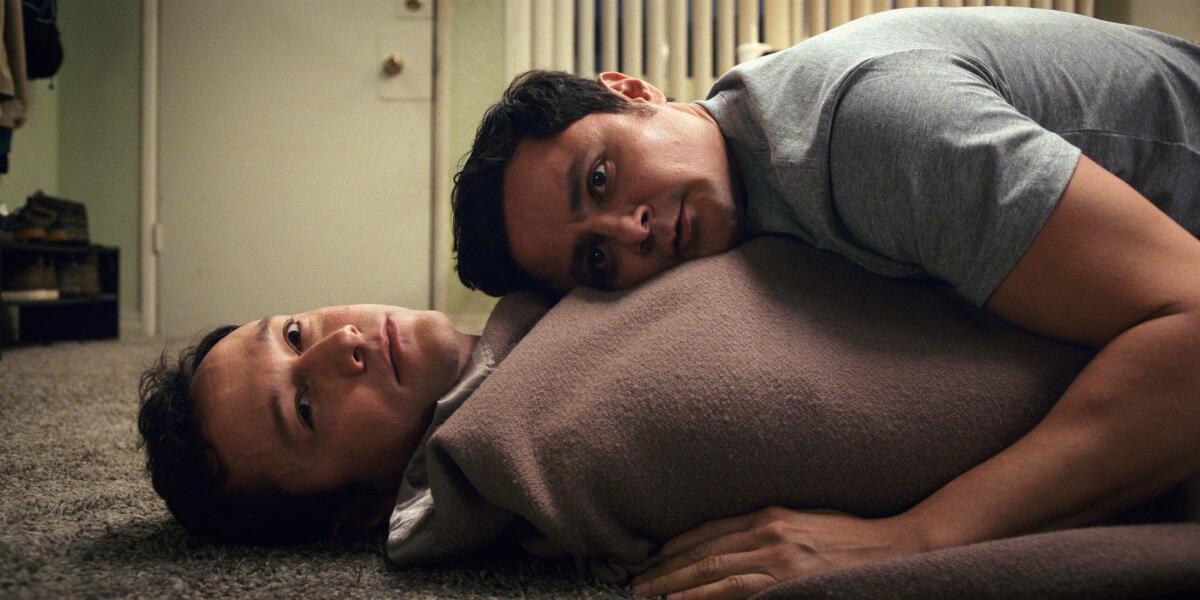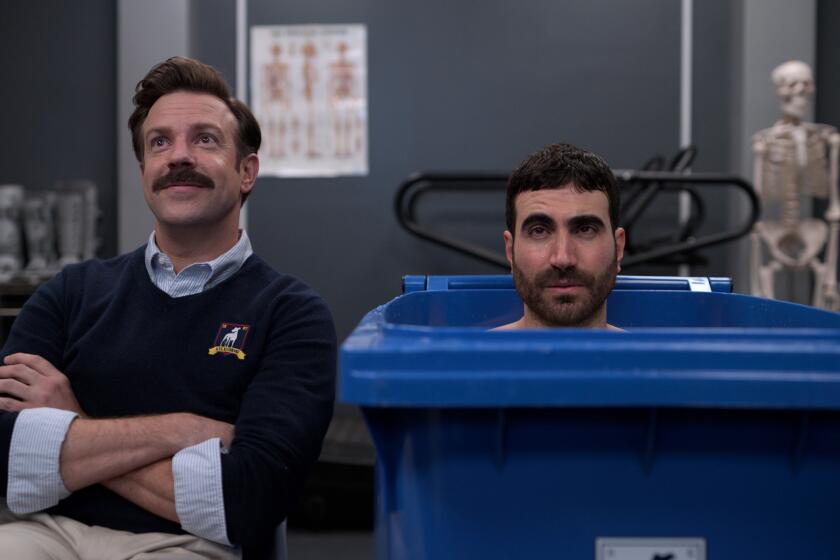In ‘Mr. Corman,’ Joseph Gordon-Levitt lets everyone shine. Except himself

In “Mr. Corman,” beginning Friday on Apple TV+, creator, director and star Joseph Gordon-Levitt plays Josh, a fifth-grade teacher in Van Nuys facing — or mostly not facing — the collapse of his rock star dreams, the not-even-recent loss of his girlfriend and his failure to communicate anywhere but inside the classroom.
Gordon-Levitt has been acting, and seemingly as busy as he wanted to be, since before he can probably remember. At 11, he was acting for Robert Redford in “A River Runs Through It,” spent his teen years on “3rd Rock from the Sun,” and has filled the 20 years since with a variety of roles in and out of the mainstream; he’s directed a well-received first feature, “Don Jon”; duetted with Lady Gaga and Miss Piggy; created an online collaborative platform/media company, hitRECord, and spun it into a TV hipster variety show; and found time to study history, literature and French poetry at Columbia, give a TED Talk, “How Craving Attention Makes You Less Creative,” and get married, have kids and relocate to New Zealand — New Zealand! — the Land Without COVID-19. He thinks deep thoughts and expresses them on talk shows. He’s like a nontoxic James Franco.
Cecily Strong and Keegan-Michael Key are a couple trapped in a magical town that plays by musical comedy rules in “Schmigadoon!” from Apple TV+.
The question he seems to be asking in “Mr. Corman” is “Who would I be if I were not fortunate enough to have been born Joseph Gordon-Levitt?” Luck and fate are explicit themes: In the opening scene, Josh (who is Mr. Corman, though Mr. Corman is also his father) asks his class the reasons for the success of the Lewis and Clark expedition. “They probably just got lucky,” says one child, randomly called upon. He polls his class on who feels lucky (one) versus unlucky (everyone else). “What about you, Mr. Corman?” “I feel like a lucky person, sure,” he replies, unconvincingly, as the hand-held camera closes in.
Josh shares an apartment with his childhood friend Victor (Arturo Castro), a UPS driver and manager as carelessly happy as Josh is careworn and miserable, overthinking everything, wallowing in self-pity, socially nihilistic, sexually malfunctioning. His claims that he loves his job ring hollow, though he seems actually to be good at it. His phone brings him only bad news: An article headlined “Climate Crisis Much Worse Than Previously Thought,” photos of his former girlfriend on Bumble. Glimpses of homeless men are accompanied by visual and audio disturbance; a meteor appears to be headed his way.

It’s not as if Gordon-Levitt gets Josh wrong — other characters continually call him out on his self-involvement. His depressive narcissism is central to the story, and it might have felt the honest thing to make him such a determined little rain cloud, and the actor does not hold back. But it also puts a black hole at the center of the story, one hard to care about; nearly every difficult situation Josh finds himself is of his own making, and when it isn’t, his handling of it is less than adult. He is bad company — on purpose, obviously, but bad company nevertheless, and one wishes that whatever dramatic slap of enlightenment is coming (this is a comedy, after all) would hurry up and arrive. To the extent it may make a viewer question his own lack of direction or satisfaction, there may be some utility in it; certainly, I have known creative people who have uneasily had to come to terms with the fact that art will never support them. You can only tell yourself that Henry Miller didn’t publish “Tropic of Cancer” until he was 43 until you’re 44.
At the same time, Gordon-Levitt has surrounded himself with great players and given them good scenes to play. As Josh’s mother, Debra Winger is particularly good: pained, proud, skeptical, frustrated, fed up, defensive, wise, maternal and not nearly as difficult as Josh wants to believe. In one of the series’ intermittent departures from conventional reality, mother and son perform a very lovely musical number, about being a mother and a son, against a photo-collaged background. (This cockeyed world will get a workout in an episode devoted to alternative worlds, in which Josh manifests as, among other things, a rich jerk, someone working with refugees, a rabbi, a guy living in the woods, a functional family man and a rock star.)
The ‘Ted Lasso’ cast and crew are delighted that Alex Morgan, Sacha Kljestan, Gregg Berhalter and Jill Ellis are among the fans who say it captures the spirit of soccer teams.
In the terrific fourth episode, entitled “Mr. Morales,” Josh plays almost no part at all; written by Roja Gashtili and Julia Lerman and directed by Aurora Guerrero, it’s the most stylistically conventional of the episodes, a slice out of the life of Victor, who has his daughter (the miraculously good Miley Delgado) for the weekend. Gabby is of an age to find both her (divorced) parents to be idiots, and lets them know in no uncertain terms, but Victor, though frustrated with her — and frustrated over what he can do for her — acts as an adult. His relationship with his ex-wife (Michelle Ortiz, also excellent) is refreshingly mature as well, and the last scene, in which two people who don’t live together anymore but have history and affection and a difficult daughter in common share a laugh, wraps it up in a pretty bow. One would guess that the episode is meant to contrast Victor’s life and character with Josh’s, but it also highlights what’s problematic in much of the rest of the series — which, like Josh, can be exhausting and overstressed.

Although there is a sort of an arc to “Mr. Corman” — Josh starts a certain way and ends a different way — and some plot lines connect one episode to another, the series feels almost like an anthology; many episodes can stand on their own, without additional explanation. A few are essentially two-person playlets: Josh and his old girlfriend/former bandmate (Juno Temple, from “Ted Lasso,” being American); Josh and his estranged father (Hugo Weaving); Josh and a woman on a Zoom date (Jamie Chung). (The series recognizes and makes good dramatic use of the pandemic, which creeps in about two-thirds of the way through.) These can feel a little theatrical, in their language and progression from point to point, but they play well, and all of Gordon-Levitt’s scene partners do fine work.
Ultimately the show is meant to be inspirational, a reminder to Be Here Now, and that you are inescapably you, but could be a better you just by being … better. These are not bad messages, even if they are more asserted than demonstrated, and even if the tracks on which Josh is journeying don’t quite line up from beginning to end. The parts here are greater than the sum, but some of them are pretty great.
‘Mr. Corman’
Where: Apple TV+
When: Any time, starting Friday
Rating: TV-MA (may be unsuitable for children under the age of 17 with advisories for coarse language, sexual content and violence)
More to Read
Updates
5:36 p.m. Aug. 6, 2021: Updated program info with TV rating.
The complete guide to home viewing
Get Screen Gab for everything about the TV shows and streaming movies everyone’s talking about.
You may occasionally receive promotional content from the Los Angeles Times.









